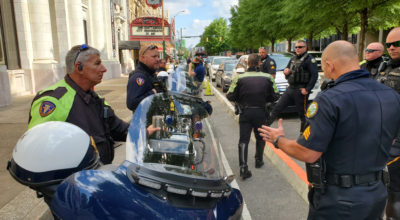


Police power across Tennessee is used to enforce the state privilege tax system upon blacks, the poor, immigrants — and all other people on highways and city streets.
By David Tulis / NoogaRadio 92.7 FM
The enforcement of the “registration and licensing of motor vehicles” law in Tenn. Code Ann. § Title 55 criminalizes hundreds and thousands of people every year. It is based on a legal presumption that the person is liable for the tax and the bearing of a registration plate, when in fact the person isn’t — is not involved in commercial use of the road.
The poor, African-Americans, immigrants and other groups of people are routinely arrested, jailed and charged under enforcement of the Tennessee law that converts cars and trucks into motor vehicles. That is the “vehicle registration” law
I have reported in detail that officers commit a separate breach of law in arresting such persons without a warrant, in violation of Tenn. Code Ann. § 40-7-103, arrest by officer without a warrant. “Driving on revoked” license, driving “unregistered vehicle” are not public offenses, and so arrest cannot occur without a warrant being issued first. Not all crimes or offenses are public offenses. Public offenses are those in the nature of a public disorder, affray, uproar or riot, according to my study as submitted to Chattanooga and Hamilton County governing bodies as an administrative notice.
Mayor Tim Kelly in Chattanooga gives token recognition of the problem of enforcing “economic crimes” upon the poor. with a program directing cops to give F$250 vouchers to people alleged to be in violation of the “light law” to let the poor afford repairs — rather than criminally charging them.
Main points about the law
➤ Cars or trucks used commercially (for hire) must be registered with the state via the county clerk, as “registration shall constitute a privilege tax upon the operation of a motor vehicle.” T.C.A. § 55-4-101(2)
➤ All cars that “operate” on the public street must be registered as motor vehicles. Operating or driving are acts done in a vehicle used in commerce. Police routinely criminalize private use of cars under their authorization to prosecute “crimes.”
➤ Who controls and regulates registration of cars — the CPD? The law in question “shall be administered by the commissioner of revenue,” T.C.A. § 55-2-101. Are police officers agents of the commissioner? (No. So they are usually unaware of the obligations under department of revenue laws and do a bad job in enforcement.)
➤ A vehicle is defined as a device used to haul goods or people (passengers) for private profit and gain.
“(91) “Vehicle” means every device in, upon or by which any person or property is or may be transported or drawn upon a highway, excepting devices used exclusively upon stationary rails or tracks.
Tenn. Code Ann. § 55-8-101 (West)
Definitions elsewhere in the code are similar. ‡ A highway is useable by any innocent, harmless member of the public using a conveyance or self-propelled device, even if it is for hire. “‘Highway’ or ‘street’ means the entire width between boundary lines of every way publicly maintained, when any part thereof is open to the use of the public for purposes of vehicular travel.” Tenn. Code Ann. § 55-1-116 ‡‡
Police, sheriff authority criminal, not administrative
Traffic “stops” or traffic arrests appear to be done in disregard of the law and in violation of the rights of the people to communicate and travel freely on the roads. The distinction between travel and transportation in Tennessee law is laid out in detail in Tennessee transportation administrative notice, given to Chattanooga and Hamilton County authorities Feb. 22 and March 1, 2018 and others on other dates.
Vehicle registration is the domain of the commissioner of revenue, whose authority to delegate administration and enforcement is limited.
The law says the commissioner “shall have the authority to delegate to the county clerks any functions and duties regarding the administration” of the registration, certificate of title and four other related chapters. The delegation is “in a written form” and is optional for the county clerk.
The law also allows the revenue commissioner to “appoint deputies,subordinate officers, clerks, investigators and other employees” who “may be necessary to carry out” the law. These staff people are in the department of revenue.
Though local deputies and officers routinely put men and women in car cages and behind bars in the jail, the law indicates the registration law is administered and enforced pursuant to a different standard than rough county justice. ∞
It’s administered under UAPA, the uniform administrative procedures act that controls the operation of all government administrative activity in Tennessee.
How using car becomes ‘crime’
The statute authorizes local officials to criminalize the registration law by filing misdemeanor criminal charges against people. The revenue department does not pay any county or city for this service, realizing that if the agency allows poaching of others, it obtains teeth for its claims to commercialize all travel by roads.
The agency effectively has a statute to shield its refusal to be bound by the uniform administrative procedures act. That act says a violation of a privilege holder must be handled in agency, under administrative law (civil law) in what’s called a contested case hearing.
(c) The duly authorized agent, employee, or representative of any town, city, incorporated municipality, county, and the department are authorized and empowered to enforce chapters 1-6 of this title[.]
Tenn. Code Ann. § 55-3-102
The registration law is enforceable as a misdemeanor.
(a)(1) It is a Class C misdemeanor for any person to:
(A) Drive or move or for any owner knowingly to permit to be driven or moved on any highway any vehicle of a type required to be registered under chapters 1-6 of this title that is not registered or for which the appropriate fee has not been paid when and as required under chapters 1-6 of this title; or
(B) Operate or for any owner knowingly to permit to be operated on lands, other than a highway, an off-highway motor vehicle for which certificate of title has not been issued or for which the appropriate fee has not been paid when and as required under chapters 1-6 of this title.
Tenn. Code Ann. § 55-3-102
The type of vehicle required to be registered, again, is that used in commerce, or hire, as either a public or private carrier, hauling goods or passengers under contract or agreement and for payment.
Charged under this law?
Men and women who are charged as criminals under this law should realize several important points about criminal prosecutions.
➤ Since the law is a revenue law, you have a right to demand the state and its agents exhaust administrative remedies under the UAPA. Demanding due process rights under the exhaustion of administrative remedy method would make prosecuting a misdemeanor traffic case an unbearable burden on the local DA’s office. He must either hound you administratively in agency, or wait for your contested case hearing in Nashville. This method of strictly constructing state law in your favor is a line of defense is developed by a dissident in the Soviet gulag, Vladimir Bukovsky.
➤ The burden of proof in a criminal matter is 100 percent on the district attorney’s office. You have to prove nothing, he everything.
➤ The charging instrument must state all the essential elements of the crime. A key essential element is evidence of commerce at the time of arrest.
➤ The officer must have obtained, when creating the criminal case, evidence of your commercial activity. That would include your testimony, documents such as bills of lading,bills of waylading, manifests, passenger lists, contracts.
➤ At the sessions court trial, ask if he has any evidence that he is willing to testify to that he obtained evidence of commerce such as ___fill in the blank_______ .
➤ Without evidence of driving (commerce), a proper motion to dismiss should win acquittal from a judge such as Gary Starnes or Lila Statom in Hamilton County.
➤ The criminal case is a tax case, and your job is to force the accuser (the state) to prove you are liable for the tax by your taxable activity, and, being liable, were unable to show proper proof of tax paid and privilege obtained. The metal registration plate is “a proof of tax paid.”
➤ You weren’t liable to pay it, and the cop on the stand has no evidence that you were liable to pay it.
Notes
∞ The rationale or the registration law: “Our statutes requiring the registration of automobiles were enacted not alone for revenue purposes, but as a means of identification of the owner of any machine negligently operated to the damage of person or property and by way of protection to those so injured by such negligent operation.“ United States Fid. & Guar. Co. v. Allen, 158 Tenn. 504, 14 S.W.2d 724, 725 (1929)
‡ “Vehicle” and “freight motor vehicle” means every device in, upon, or by which any person or property is or may be transported or drawn upon a highway, excepting devices moved by human power or used exclusively upon stationary rails or tracks.
Tenn. Code Ann. § 55-1-103
‡‡ The highway is free for use by the people of the state. “Vehicular travel” uses the commercial word for conveyance. This usage does not impliedly ban private use of the roadways. Rather, the term shows the law allows and permits privileged use of the road — not by right — traveled by the members of the free public who use it for pleasure and other purposes.



It is really simple, this is what People need to understand.
Charged under this statute?
➤ The charging instrument must state all the essential elements of the crime. A key essential element is evidence of commerce at the time of arrest.
Without it, the tribunal never acquires jurisdiction/authority (with regard to you, in your lawful and harmless activities), and the tribunal is necessarily VOID, by actual Law.
➤ Without evidence of driving (commerce), you have been assaulted with false arrest/imprisonment and Deprivation of Rights under color of Law, under Title 18 U.S.C. 242.
Which does apply to the city/county/state as a sub-division of the federal District.